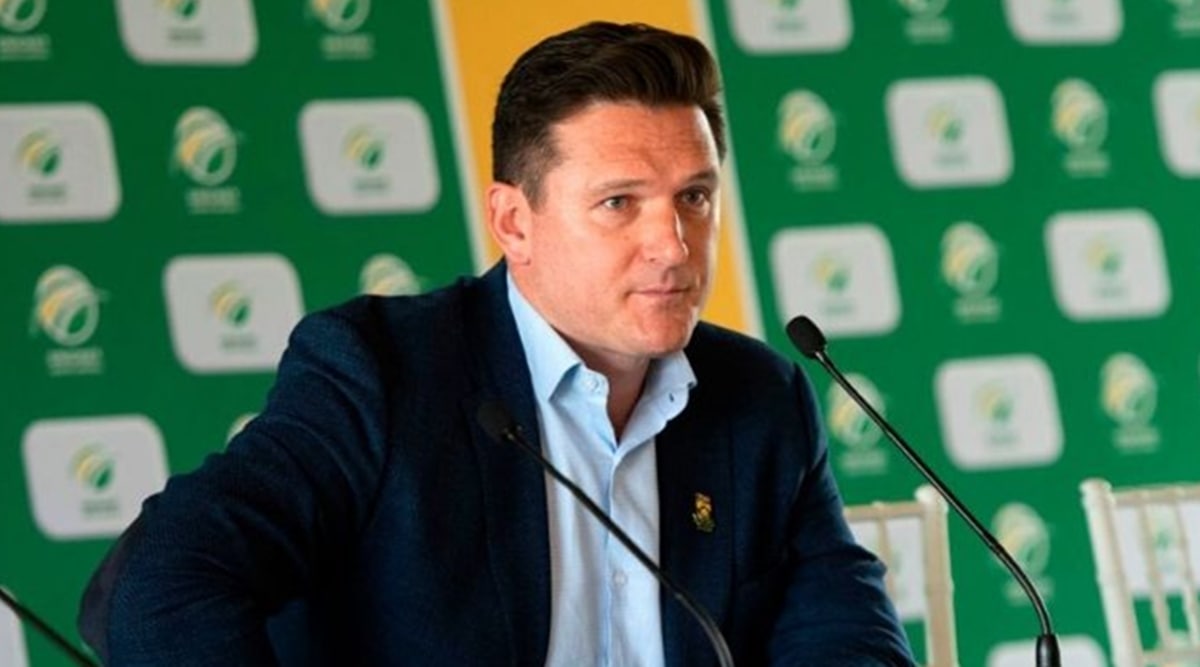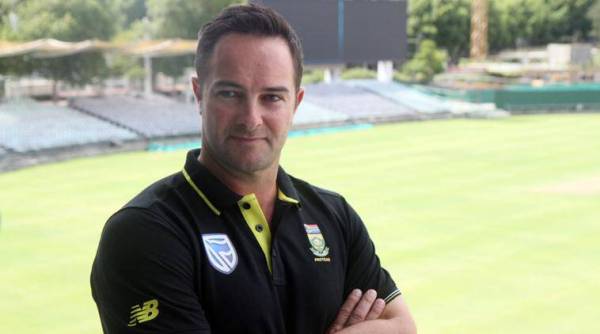 Allegations of racist behaviour against former national captain Graeme Smith were parsed by an arbitration panel arising from the earlier Social Justice and Nation Building (SJNB) hearings of Cricket South Africa. (File Photo)
Allegations of racist behaviour against former national captain Graeme Smith were parsed by an arbitration panel arising from the earlier Social Justice and Nation Building (SJNB) hearings of Cricket South Africa. (File Photo) South African cricket, in its 30th year of return from the Apartheid ban, continues to walk its delicate tightropes, thread-baring legal fairness and reckonings with racism, the process resting on underpinnings of truth and reconciliation in the game of cricket. In the latest development, allegations of racist behaviour against former national captain Graeme Smith were parsed by an arbitration panel arising from the earlier Social Justice and Nation Building (SJNB) hearings of Cricket South Africa.
The arbitration stated that Smith’s actions could not be proved to constitute unfair racial discrimination or evince racial bias, after the SJNB Ombudsman’s inquisitorial process earlier. The Ombudsman had assessed allegations about Smith, who was captain of the national men’s cricket team from 2003 to 2014 and later CSA’s first Director of Cricket (DoC) in December 2019.
The issues that came in for scrutiny as mentioned in the 95-page report of the arbitration:
Omission of Thami Tsolekile
Case: The Ombudsman’s tentative findings had pointed a finger at Smith who “likely had some influential role in decisions between 2012 and 2014 not to select Mr Thami Tsolekile for the Proteas.”
Former CSA Director of Cricket, Graeme Smith has been cleared by two independent arbitrators of racism allegations against him, which emanated from CSA’s Social Justice and Nation-Building (SJN) process.
Full details ➡️ https://t.co/bJblhS8v69 pic.twitter.com/eCU9oMxjqW
— Cricket South Africa (@OfficialCSA) April 24, 2022
The arbitration had been asked to decide whether Smith had kept Tsolekile out as a wicketkeeper by reason of his race.
The controversy concerns SA’s series against England and Australia touring, and when hosting New Zealand in 2012-13. “Mr Tsolekile testified that, around the time he was awarded his contract, selector (Andrew) Hudson told him, while he was unlikely to play against England or Australia, he could or would play in the home series against New Zealand. Mr Hudson, in his statement, denies that it was a guarantee, but said he told Mr Tsolekile he was likely to get his shot against New Zealand. Whatever Mr Hudson told Mr Tsolekile, there is no claim that Mr Smith gave any assurances – for or against Mr Tsolekile – at this time. It was not even alleged by CSA that Mr Smith was aware of any promise,” the report reads.
Arguments: While the captain is not a member of the selection panel, the captain “is entitled to freely and strongly indicate his preferences in selection.” Tsolekile contended that after Mark Boucher injured his eye and subsequently retired, De Villiers stepped in as the back-up ’keeper, even as Tsolekile was called up. Hudson explained the selectors’ thinking as follows: “De Villiers taking the wicketkeeping gloves gave the team the ‘X factor’ and allowed us, the selectors, to select an extra batter at No. 7.” The statement was put to Tsolekile who agreed with the proposition that this was “a strategy.”
Smith’s evidence pointed that Boucher’s injury created “an opportunity to bring in Mr Jean Paul Duminy who was a frontline top-order specialist batsman. In turn, that lengthened your batting line up with seven top batting performers.” South Africa would rise to No. 1 in the world over the next two series, and finally blood in Quinton de Kock.
South Africa’s Transformation Policy – the guiding principle – was argued, given there was no Black African in the Proteas team that played the Tests in England. There were, however, five coloured players – Hashim Amla, Alviro Petersen, Vernon Philander, JP Duminy and Imran Tahir – who played all four Tests.
“Again, Mr Smith did not speak against Mr Tsolekile, or in his favour. He accepted the strategy followed by the selectors that had been successful in England. Mr Tsolekile himself did not complain about his treatment at the time, or in his evidence. He appeared to accept that the same “cricketing reasons” that justified selecting Mr De Villiers in England still applied in Australia.”
However, Tsolekile mentioned that Makhaya Ntini – a former Proteas fast bowler, and one of the few Black Africans to play for the Proteas – had publicly stated that: Tsolekile would have been selected if he was White.” Tsolekile did not support this claim at the time. He indicated that he did not want to upset the team environment. However, not being picked for the New Zealand series aggravated Tsolekile’s unhappiness as it became clear de Kock would be next in line. Selector Linda Zondi testified: “Mr Smith did not influence the decision of the selectors not to select Mr Tsolekile as a wicketkeeper by reason of his race.”
Conclusion: “There is no direct evidence, concerning the England tour, that Mr Smith actively influenced the selectors to exclude Mr Tsolekile from the playing XI. Instead, it appears to be accepted that Mr De Villiers was selected because of his ability, not because of his race. It is also common cause that Mr Smith supported that decision and did not use his influence to advocate in favour of selecting Mr Tsolekile for the playing XI in England.” While the arbitration concluded that Smith did wield influence, it could not establish Tsolekile’s omission had racist reasons.
Boucher/Nkwe issue
Case: This concerned the appointment of Mark Boucher as Proteas Head Coach and if it amounted to unfair racial discrimination with respect to Enoch Nkwe. The latter, a Black, had obtained a Level 4 coaching certificate – the highest available one – and coached one of South Africa’s professional teams – the Highveld Lions – winning Coach of the Year award in 2019 and served as interim coach for the Proteas on their ill-fated tour to India in 2019. Boucher had played international cricket for 12 years. Smith, himself being head-hunted in November 2019 for the post of Director of Cricket, was keen on finding a coach who could pick the pieces after the disastrous 2019 World Cup, and went for “international experience” with England due to tour soon.
 Mark Boucher.
Mark Boucher. Smith was accused of not following a formal process of gathering CVs and interviewing candidates, and preferring Boucher.
Arguments: Smith testified that CSA was aware of his idea to appoint Boucher and did not object to his preference or insist on a process, but approved of the choice. The report reads: “His given reasoning – a head coach of a national team is an extremely high pressurised position, you are at the cold face of the world media, the world crowds, people don’t care about CSA’s equity proposition, they care about results, and I felt that CSA and the team at the time needed someone that had extensive experience in dealing with conditions, with the pressures that come with the international game. I knew that this team was going to lose extensively upfront, it was going to take time to build and I felt that I need a character that could handle that.”
Smith also made six other appointments: Mr Zondi as convenor of selectors; Mr Charl Langeveld as bowling coach; Mr Justin Ontong as fielding coach; Mr Ashwell Prince as head coach of the SA A side; Mr Volvo Mashibalele as team manager; and Ms Siphokazi Sokanyile as media manager. “All six are Black” the report said.
Conclusion: The report concluded that though the process followed was unsatisfactory, and Nkwe received an unfair deal, this did not amount to “indirect discrimination” by Smith.
“CSA did not establish that Mr Smith directly discriminated against Mr Nkwe on the basis of his race.
- The Indian Express website has been rated GREEN for its credibility and trustworthiness by Newsguard, a global service that rates news sources for their journalistic standards.

